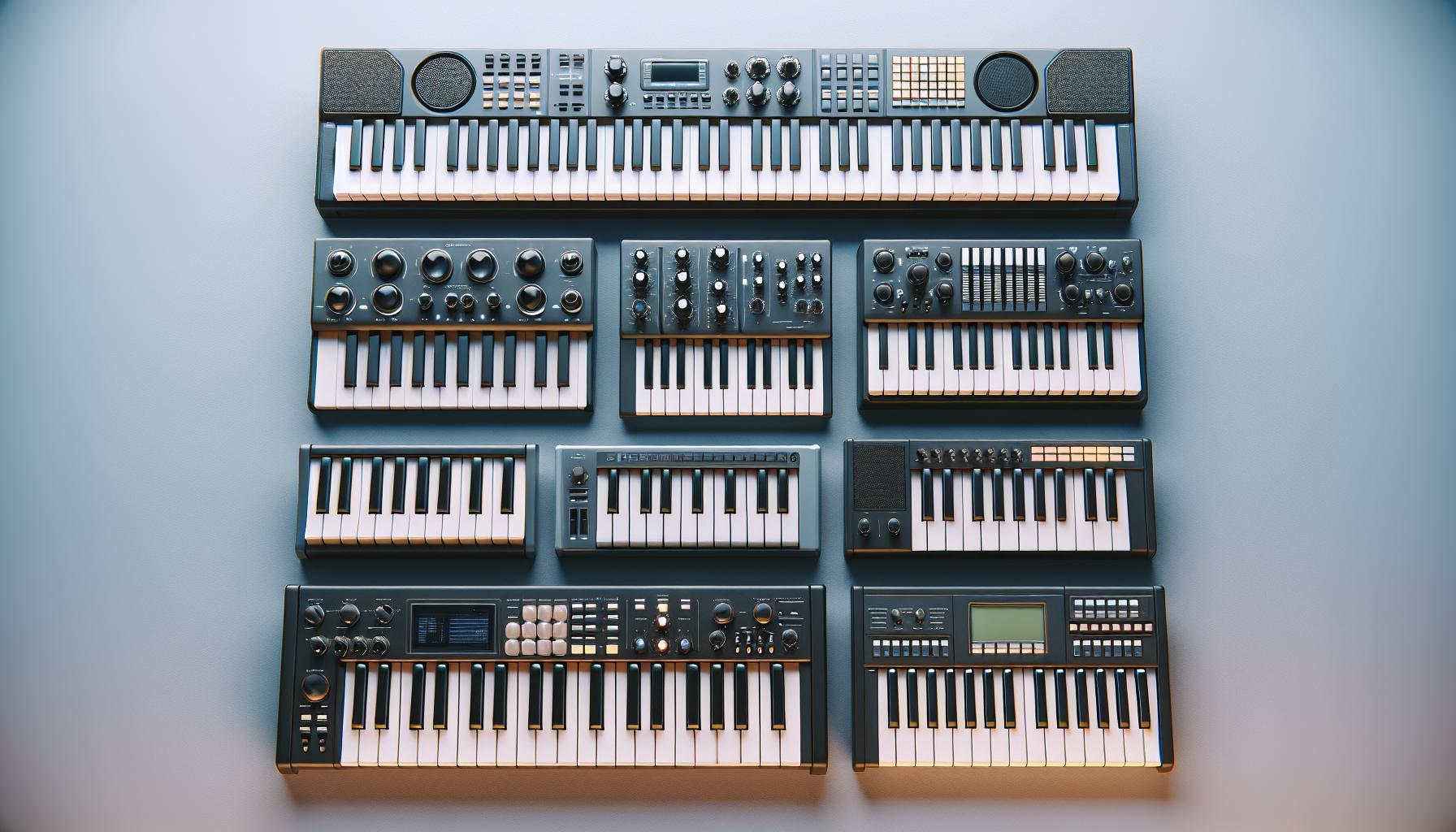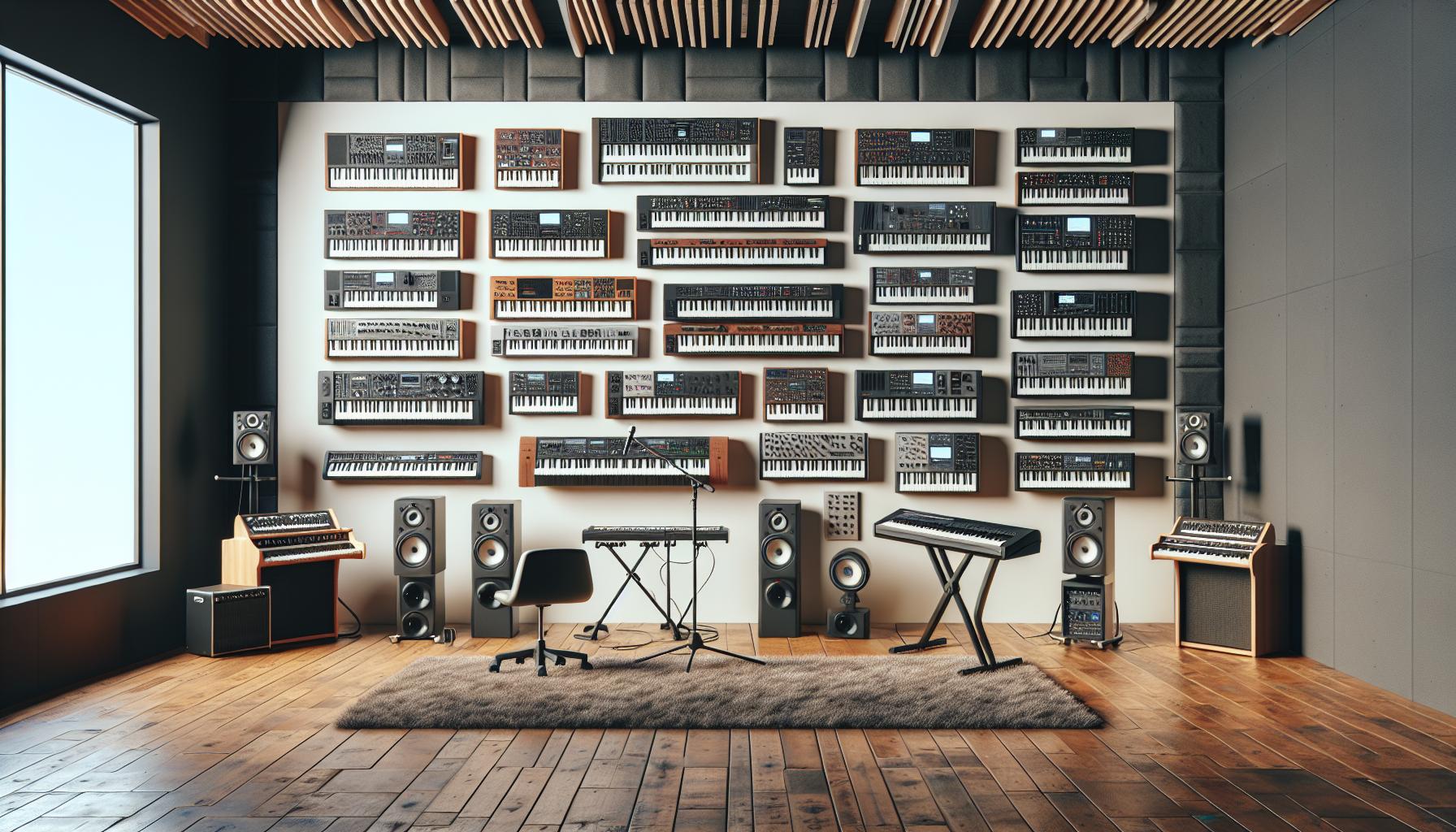When it comes to music production, it's all about having the right tools at your fingertips. And one of the most versatile instruments in a producer's arsenal? That'd be the multi-functional piano keyboard.
These aren't your average keyboards. They're designed with a slew of features that can take your music production to the next level. From built-in sound libraries to MIDI compatibility, they've got it all.
Whether you're a seasoned producer or just starting out, a multi-functional piano keyboard could be just what you need to elevate your sound. So, let's dive in and explore the world of these incredible instruments.
Features of multi-functional piano keyboards
One of the key benefits of multi-functional piano keyboards lies in their comprehensive feature set. These instruments pack an array of sound enhancing features designed to help users fine-tune their art, thereby providing a unique touch to every music piece.
For starters, most modern multi-functional piano keyboards come with a built-in sound library. This feature allows the user to incorporate a wide range of instrument sounds into their music without the need for separate audio hardware. From traditional instruments like the violin, guitar, and drums to more exotic sounds such as sitar, harpsichord, and lackadaisical synths - the options are virtually endless.
Another impressive feature is MIDI compatibility. MIDI, or Musical Instrument Digital Interface, is a standard that allows different digital music tools and devices to communicate with each other. Piano keyboards with MIDI compatibility can be connected to various other devices like computers, digital audio workstations (DAWs), and other MIDI controllers, providing a seamless experience for music producers.
Not to overlook weighted keys, an often underappreciated detail that significantly affects performance and sound output. Multi-functional piano keyboards often have different key weight options. Users can select lighter keys for swift playing or heavier keys that provide more resistance for a stronger tactile sense of playing.
Moreover, there's recording capability. Many multi-functional keyboards offer built-in mechanisms that allow for easy recording and playback of compositions. This feature is quite practical for professionals who can't afford to lose a moment of creativity, as well as beginners who want to listen to and refine their playing.
Wrap it up with the ability to layer sounds. This allows for multiple tones to be played simultaneously, combining to create a richer, more layered sound than what can be achieved with a single string of notes.
To sum up, a multi-functional piano keyboard truly redefines the boundaries of music production with its exceptional feature set, elevating sound to a whole new realm. Whether you're an expert or a beginner, incorporating these keyboards into your setup proves incredibly beneficial.
Benefits of using multi-functional piano keyboards for music production

In a tech-driven world, multi-functional piano keyboards serve as a potent toolbox for both novice and experienced musicians. These high-spec gadgets are beneficial in multiple aspects when it comes to music production.
For starters, these keyboards pack a vast built-in sound library. These sounds replicate a variety of different instruments, giving artists the freedom to experiment beyond the piano. Incorporating sounds of a guitar, violin, flute or drums into compositions has never been simpler.
A grand leap from traditional models, these keyboards also come with MIDI compatibility. This attribute allows a seamless connection to computers, digital audio workstations or other MIDI-enabled devices. It opens up a realm of possibilities in terms of audio editing, beat making, scoring, and even virtual instrument playing.
One of the most significant attributes of these multi-functional keyboards is the presence of weighted keys. This addition bestows them with a realistic piano-like feel, enhancing the overall playing experience. Musicians can adjust the key weight to fit their preference, giving them greater control over how they play.
In terms of the recording, these keyboard models feature automatic recording and playback capabilities which can be incredibly useful for musicians. They can easily record and playback their compositions, enabling them to polish their pieces to perfection.
Lastly, and perhaps most exciting is the capacity to layer sounds. This means that users can add multiple sounds together to create a completely new layered sound. This opens up countless new possibilities for creativity and can make compositions sound fuller and richer.
All these features amalgamate to provide an elevated and comprehensive platform for music production. Users can let their creative juices flow freely and explore unchartered territories without being tethered by restrictions.
Types of multi-functional piano keyboards

Different types of multi-functional piano keyboards cater to the needs of various musicians. The variety scopes from beginner-friendly options to professional-grade models. It's crucial to identify the kind that suits one's needs best.
One of the most common types is the Portable Keyboard. These lightweight, compact keyboards are perfect for musicians on the go. They often pack in a substantial sound library, allowing on-the-move creativity.
For the music producers that want authentic piano feel, the Digital Pianos are an excellent choice. They offer weighted keys, giving the sensation of playing an acoustic piano. Digital pianos also boast high-quality, realistic sound samples.
Next, we have Arranger Keyboards. These are a massive hit with songwriters and composers. They have built-in accompaniments and patterns, perfect for laying down quick song ideas.
Last but not least, the Workstation Keyboards are the ultimate tool for the serious music producer. They're essentially a music production studio encapsulated in a keyboard. From layering sounds to manipulating effects, the possibilities are vast with workstation keyboards.
Each of these keyboards varies in price, features, and functionality, so it's worthwhile getting a clear understanding of what each offers. Take a look at the table below to get an idea:
| Keyboard Type | Best For | Feature Highlights |
|---|---|---|
| Portable Keyboard | On-the-go musicians | Lightweight, vast sound library |
| Digital Piano | Authentic piano feel enthusiasts | Weighted keys, high-quality sound samples |
| Arranger Keyboard | Songwriters and composers | Built-in accompaniments and patterns |
| Workstation Keyboard | Serious music producers | All-in-one production studio, sound layering |
As a music producer, the choice of a multi-functional keyboard hinges on personal preferences and music production goals. That's the fascinating part - the keyboard you choose becomes an integral part of your unique sound.
Top brands in the market

Yamaha, a pioneer in the music industry, stands tall among the top brands offering multi-functional keyboards. Their keyboards boast high-quality sound, realistic touch response, and a vast array of built-in voices, styles, and effects. They've got keyboards specifically designed for learners and professionals alike.
Moving ahead we find Roland, another giant in the music equipment market. Known for their high-end, cutting-edge tech integrated into every keyboard, they contribute to the uniqueness of each musician's sound. Their workstation keyboards are particularly popular for their incredible versatility and comprehensive features.
Don't underestimate the offerings of Korg, as their keyboards provide an exciting mix of functionality and affordability. Their range includes everything from beginner-friendly keyboards up to the more advanced workstation keyboards.
Casio is an option worth considering, particularly for those on a tighter budget. Long gone are the days when Casio was considered inferior. Today, their premium line of keyboards offer an impressive array of features without straining your wallet.
Nord can't be left out when discussing the best in the business. Their handcrafted Swedish keyboards are known for being robust, portable and delivering exceptional sound quality. Nord's keyboards are the choice of many touring musicians due to their bright red appearance and phenomenal performance.
Lastly, Arturia is making waves with their innovative designs. Their hybrid keyboards blend traditional piano elements with modern technology to create a seamless player experience. Particularly worth noting is their powerful software integration, giving musicians a whole new dynamic to play with.
Though each brand has its strengths, it's crucial to remember that the best keyboard depends entirely on the musician’s individual taste, style, and needs. After all, it's the musician that makes the music, not the keyboard alone. So, while these brands offer some of the best options around, it ultimately boils down to what feels and sounds right for each individual artist.
Tips for choosing the right multi-functional piano keyboard

Choosing the right multi-functional piano keyboard can feel like a daunting task given the array of options available in the marketplace. When sifting through the landscape of brands like Yamaha, Roland, Korg, Casio, Nord, and Arturia, it's crucial to remember that the perfect keyboard is usually the one that resonates the best with a musician's individual taste, style, and needs.
Understand Your Needs: One does not buy a keyboard on whim or just because it looks fancy. The purpose of purchase should guide the decision-making process. Is the keyboard for recording, production, live performances, or personal use? The answer to this question will help narrow down the options.
Budget Consideration: Another vital aspect to consider is budget. Keyboards range in price from affordable to quite steep. Determine your budget beforehand and stick to it. There's a wide range of quality keyboards available at every price point.
Key Quality and Action: One of the most important considerations when buying a keyboard is the feel of the keys under the fingers. Some prefer the weighted keys of an acoustic piano while others like the light touch of synthesizer keyboards. Spend enough time at the store hitting those keys to decide which ones feel the most comfortable.
Check the Sound Quality: Listen carefully to the various sounds the keyboard makes - not just the tones but also the volume and the resonance of the notes. High-quality keyboards should have a rich and full sound.
It helps to keep in mind that ultimately, the purpose is to produce music that satisfies. Make sure to explore a variety of options, keep these tips handy, and be prepared to make an educated choice. Every musician has a unique touch and style, honoring that is the true art of music making.
Conclusion
So there you have it. Choosing the right multi-functional piano keyboard for music production isn't a one-size-fits-all solution. It's about finding the keyboard that resonates with your unique style and meets your specific needs. Whether it's Yamaha, Roland, Korg, Casio, Nord, or Arturia, each brand brings something special to the table. But remember, it's not just about the brand. It's about the key quality, sound quality, and of course, your budget. So take your time, explore different options, and make an informed decision. After all, the right keyboard can make all the difference in your music production journey. Happy playing!
Harlan Kilstein began playing piano during covid with no piano background at all. He taught himself how to play learning what to do and what not to do.
Today he's an advanced intermediate player and can help you grow in your skills because he learned all this on his own.








